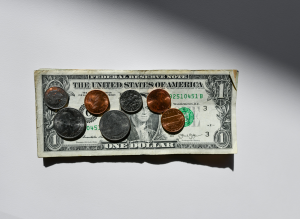Isn’t it amazing that most grade schools don’t teach children about money management? It is no wonder many people develop lousy money habits once they become adults. They don’t have the understanding or discipline to make better decisions with their money.
Does this sound like your financial situation? If so, the good news is that you don’t need to let bad money habits drag you down a financial rabbit hole forever. The trick is to learn about these bad money habits and then take steps to break them once and for all.
Below are the top 8 bad money habits you must break today.
1. Not Creating a Monthly Budget
The number one mistake people make with their money is not budgeting it. They spend money as soon as they get their paycheck without properly allocating it toward bills and savings. That is how many people end up with substantial debt and the inability to pay their bills.
Creating a monthly budget will help you allocate your income toward bills and savings. Then, everything left over can be discretionary spending on whatever you want. At least you will have peace of mind knowing that you won’t overspend once the rest of your money goes toward bills and savings.
2. Not Saving Money for Emergencies
Did you know that over 40% of Americans cannot afford a $500 emergency expense? Even people living paycheck-to-paycheck should be able to put $500 into savings to cover emergencies. Indeed, you could spare $50 to $100 from each paycheck to put into savings for emergencies. If you wanted to, you could make it happen.
The problem is that many people never put away any money into savings. They are too busy paying bills and spending everything else on non-essential items. If you have developed this habit, look for anything you could stop spending money on, such as streaming subscriptions or restaurants. Put the little money saved into savings, which will add up quickly.
3. One Source of Income
The average person’s only source of income is the money they earn from their job. Most people don’t have any other sources of income. The common reason is that they don’t know how to create another source of income, or they feel like they don’t have the time to make one.
Creating multiple sources of income can help you save money, build an emergency fund, and allow more discretionary spending. If you’re tired of living paycheck to paycheck, consider various ways to generate multiple income sources.
Some ideas for generating more income include side hustles like Uber driving, freelance writing, and Grubhub deliveries. Consider what skills or abilities you possess that can be turned into side hustles to generate cash.
4. Accumulating Too Much Debt
Another common mistake people make with their money habits is accumulating too much debt. If you frequently make purchases on your credit card without paying the balance quickly, you will accrue more monthly debt. Then, if you run into financial troubles, you’ll be stuck with limited income and lots of debt. That is not a good situation.
Make sure you allocate some of your monthly income toward paying down your debts, whether credit card or loan payments. Your goal should be eliminating your debt so you don’t have to pay more interest. If you can do that, you will be debt-free with more money to put into savings or investments each month.
5. Making Impulsive Purchases
Are you the type of person who feels the urge to purchase items you don’t need? Perhaps you browse online stores or shopping malls and feel the impulse to buy something attractive when it is on sale.
Impulsive purchases are unplanned and can lead to financial disaster if you’re not careful. If you are already on a tight budget, making too many impulsive purchases could prevent you from having enough money to pay your bills. Where will you be then?
Avoid impulsive purchases by creating a list of essential items you need to buy and nothing more. Stick to that list without looking at any other items. It is also best to avoid online shopping because it is too easy to make purchases.
6. No Retirement Savings
Too many young and middle-aged adults don’t think about their retirement. They choose not to put a portion of their monthly income into retirement accounts, such as an IRA or 401(k). Then, when they get to retirement age, they don’t have anything saved for it.
Retirement accounts allow you to build wealth while enjoying some generous tax savings. Put a portion of your monthly income into a retirement account for the next 20 or 30 years. You’ll be surprised how much the account has grown over those years, both from your contributions to it and its investments.
7. Late Bill Payments
Are you often late paying your bills? If you have the money to pay your bills but wait until the last minute to pay them, you could accumulate higher interest rates or possibly even a lower credit score.
Don’t let this happen. Most companies and service providers make it easier than ever to remember to pay your bills on time. Just set up automatic payments with them to pay your monthly bills, so you don’t have to remember to pay them manually.
8. Paying for Everything with Credit Cards
Credit cards make it too easy to purchase things online and in person. Many people don’t think about how much debt they accumulate on their credit card accounts, especially when buying everything with credit cards.
It is best to use credit cards only for emergency purchases. All other spending should come from debit cards, cash, or checks to avoid accumulating more debt on everyday purchases.
Conclusion
Breaking bad money habits is a timely process. You might fail at it numerous times, but that’s okay. All you need to do is stay consistent by implementing the abovementioned strategies into your daily routine.
Eventually, you will start breaking those bad money habits and replace them with better habits that lead to financial growth and success.






